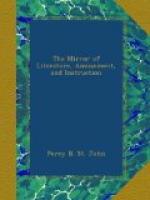The foregoing are the fruits found wild in our climate; the difference in their aboriginal and cultivated state has been pointed out; we shall now give short descriptions of foreign fruits, which have been partly naturalized, the management of which forms so considerable a share of the gardener’s art and attention.
The Apricot.—It is supposed that this fruit is a native of Africa: from thence it appears to have come through Persia and Greece to us, with the name “a praecox,” significant of its earliness. There are several varieties which have been obtained by means similar to those already mentioned; and there is room for further exertion in endeavouring to improve the size of the fruit, or any other desirable quality.
The Peach—This delicate and excellent fruit is a striking instance of what judicious cultivation may produce. The common almond has always been considered the original stock of this monument of skill and assiduity. The estimation in which it is held, and the care and expense incurred in its cultivation both in forcing-houses and in the open air, is proof of its superiority: and no fruit repays the labour of the attendant, or the expense of the owner, more bountifully than this. Seedlings of this fruit are, if we can credit what is written and said of it, less inclined to depart from the properties or qualities of the parent, than most others of our improved fruits. In America, they are in common and general cultivation. No trouble is bestowed in either layering (which is practicable), or budding them. Sowing a quantity of the stones, they are sure to pick out from among the seedlings as many good sorts as they may wish to cultivate: few of these may be exactly like the parent; some may be superior, but all are passable, especially if the young trees have been selected by a skilful hand; and this he is enabled to do, merely from the appearance of the wood and leaves. Many new sorts have lately been obtained and brought into notice in this country; and this facility of the peach to multiply its varieties will no doubt be taken advantage of by propagators.
The Nectarine.—This, it is allowed by all writers, is certainly a child of cultivation: there being no wild plant from which it could be derived, except the almond. It is therefore a collateral branch with, or rather of, the peach: of this no better proof can be given, than the circumstance that nectarines are sometimes produced by a peach tree.




